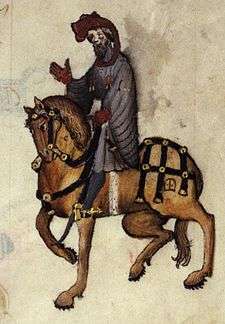The Knight (Canterbury Tales)

The Knight is a fictional character from the Canterbury Tales, by Geoffrey Chaucer, who was depicted as a soldier for the king who fought in many battles and jousts.[1] He usually fought in battles to different countries to try convert the whole nation to Christianity.[1] The main goal for the Crusades was to recapture the Holy Land from the Muslims. His social standing, along with his son, the Squire, was high due to their aristocracy.[2] The Knights duty as the kings servant was leading large crusades to defeat people from non-Christian lands.[3] Although we seem to know that the Knight is one of the most likeable characters in the story, Chaucer fails to tell us about the Knight's origins or why he became a knight to begin with. Nevertheless, the Knight still has a lasting good impression on first time readers.
Prologue
The Narrator begins his in depth explanation of each character with the Knight. In lines 43-47, the narrator tells us the knight is chivalrous and valiant, and an honourable and noble servant to his king.[4] Line 55 tells us the Knight was a great warrior.[5] Lines 67-72 tells us he was the perfect knight and even though he was playing a "villain's part", he always did right.[6] In lines 72-78, the Narrator tells us that the Knights attire, although having a beautiful horse, wasn't the best. He had on an old tunic and rusty coat of mail due to all his expeditions.[7] The Narrator couldn't stress it enough that the Knight was just the perfect gentleman; he was valiant, honourable, gentle, giving, truthful and courteous. The language of English has changed a lot from the Middle Ages to now as seen from the many variations and translations of the Canterbury tales. For example, chivalry was spelled chivalrie, knight was spelled kynght, Russia was spelled Rucen, Christian was spelled Cristen and the Mediterranean Sea was known as the Grete Sea.[8]
Chaucer's opinion
Often in this story, Chaucer criticizes most of the characters. But Chaucer describes the Knight with actual nice profound words. It is almost as if the Narrator admired the Knight for his chivalry and makes the knight stand out because of his generosity and dignity. Line 65 'He found the highest favour in all eyes' shows us that not only did the Narrator see him as a higher adversary, but everyone around him enjoyed his presence too.
References
- 1 2 "SparkNotes: The Canterbury Tales: Analysis of Major Characters". sparknotes.com.
- ↑ "The Prologue". cliffsnotes.com.
- ↑ http://thebestnotes.com/booknotes/Canterbury_ Tales/Canterbury_Tales36.html
- ↑ Chaucer. The Canterbury Tales. pp. Lines 43–47.
- ↑ Chaucer. The Canterbury Tales. pp. Line 55.
- ↑ Chaucer. The Canterbury Tales. pp. Lines 67–72.
- ↑ Chaucer. The Canterbury tales. pp. Lines 72–78.
- ↑ "Chaucer: The General Prologue - An Interlinear Translation". harvard.edu.